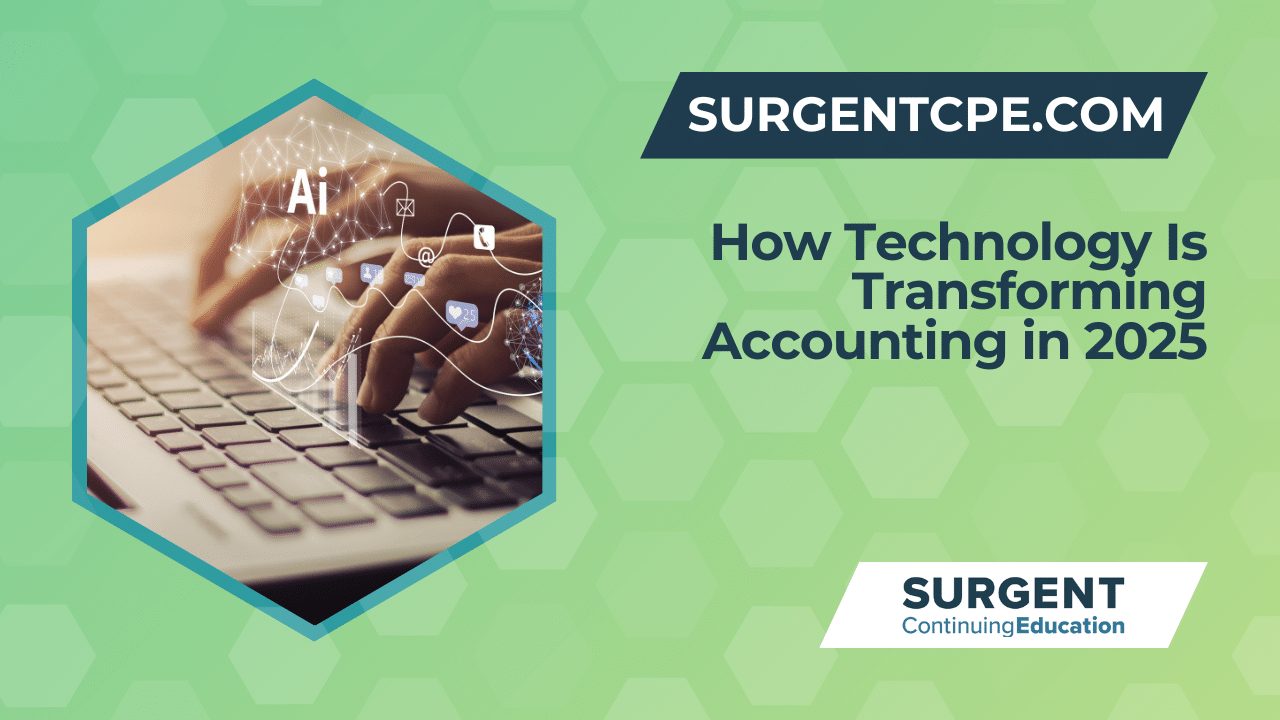Accounting technology now goes far beyond spreadsheets. Finance professionals work with interconnected systems including cloud platforms, artificial intelligence, blockchain networks, and cybersecurity tools that fundamentally change how organizations record transactions, manage risk, and deliver insights to stakeholders.
The Public Company Accounting Oversight Board moved away from “technology-neutral” oversight in 2025, creating frameworks specifically for technology-based assurance. The clear message: technology skills are now essential professional competencies, not optional extras.
Why Technology Matters More in 2025
AI Adoption Accelerates
The accounting AI market reached $6.68 billion in 2025 and is projected to hit $37.6 billion by 2030—a 41% annual growth rate. According to the 2024 Intuit QuickBooks survey, 98% of accountants now use AI to help clients and their businesses. The shift happened faster than many expected.
Research from CPA.com shows 85% of accounting professionals feel excited or intrigued by AI’s potential. Top benefits include increased speed and efficiency (85%), error reduction (68%), and task automation (65%). Yet only 37% of firms actively invest in AI training for employees—creating a competitive advantage gap.
Documented Results
Stanford research tracking 277 accountants found those using AI support more clients per week and finalize monthly statements 7.5 days faster. They spend 8.5% less time on routine processing while reporting quality improved by 12%. Firms using AI saw more detailed financial records rather than less, with expenses broken down into specific categories like bonuses and benefits instead of general payroll.
Employees receiving formal AI training save 8-19 hours weekly according to Karbon’s 2025 survey of over 500 professionals. A Fortune 100 multinational tax implementation cut documentation costs by 30% and audit adjustments by 40%.
Regulatory Requirements Build
Multiple PCAOB standards take effect between 2024 and 2026 covering auditor responsibilities and technology-assisted analysis. The AICPA’s System of Quality Management creates technology governance requirements for firms. Organizations unable to demonstrate competent technology use face regulatory findings, inspection issues, and potential client losses.
AI Applications Across Accounting
Automating Routine Work
Modern AI automatically codes expense reports to correct cost centers, reducing manual effort by 60-80% in pilot studies. Generative AI drafts narrative sections of regulatory filings for controller review. The technology detects duplicate or fraudulent invoices in real-time while maintaining transparent audit trails.
Microsoft Copilot, built into Microsoft 365, generates financial forecasts and creates complex spreadsheets from simple prompts. The 2025 CPA Practice Advisor Innovation Awards highlighted AI tools that autonomously plan and execute audit tasks while keeping human auditors in control with real-time approvals.
Audit Transformation
AI agents now extract, validate, and cross-reference third-party confirmations, reducing fieldwork cycles by up to 50% in Big Four trials. Early adopters forecast PCAOB deficiency rates dropping from 28% in 2024 to under 10% in 2025, crediting AI-driven testing.
Updated auditing standards effective December 2025 require auditors to test electronic information reliability and related controls end-to-end, driving integration of security monitoring directly into ledger systems.
Tax Function Improvements
E-invoicing and digital tax systems are expanding across US states. Tax authorities increasingly use AI to flag misclassified transactions with 75% precision and predict audit candidates at 90% accuracy.
Advanced analytics cut transfer pricing documentation costs by 30% and boost tax provision accuracy by 25% in multinational US company implementations. IRS modernization initiatives and state-level digital compliance requirements are pushing firms toward automated, API-driven systems.
Blockchain’s Growing Role
The accounting blockchain market reached $868 million in 2025. Over half of Fortune 500 companies now use distributed ledger technology in some capacity. In January 2025, the SEC issued Staff Accounting Bulletin 122, replacing previous rigid crypto-asset accounting requirements with a more flexible framework that addresses innovation concerns.
Blockchain implementations at major corporations collapsed reconciliation timeframes from 10 hours to under four hours while providing immutable audit trails. Smart contracts enable real-time control evidence, allowing auditors to verify completeness without manual sampling. The technology’s transparency, security, and accuracy make it valuable for reducing fraud risk and streamlining audits.
Cloud and Data Analytics
Cloud-based lakehouse architectures deliver processing speeds up to 11 times faster than traditional systems, enabling real-time fraud detection and continuous controls monitoring. Systems flag exceptions within minutes rather than weeks or months.
Analytics tools provide four levels of insight: descriptive (what happened), diagnostic (why it happened), predictive (what will happen), and prescriptive (what to do about it). These capabilities improve forecasting, cash flow planning, risk management, and profitability analysis.
Addressing AI Challenges
Data Security Concerns
70% of accounting professionals worry about data security when evaluating AI tools. Large language models can memorize sensitive training data. Firms must encrypt data in transit and at rest, apply differential privacy techniques, and enforce strict prompt logging to prevent data leakage.
Bias and Accuracy
Recent research showed credit risk scores shifting materially based solely on gender or nationality changes. AI systems occasionally produce incorrect information or “hallucinate.” Mitigation requires fairness metrics, representative training data, regular independent audits, and mandatory human review for high-impact decisions.
Implementation Planning
Successful integration requires team training, systems integration, and clear client communication. The Association of Certified Fraud Examiners found 18% currently use AI for fraud detection while 32% plan implementation within two years. Starting with pilot projects in controlled environments allows experimentation without production risk.
Building Technology Skills
Accounting professionals can develop competency through CPE courses covering AI fundamentals, data analytics, and blockchain basics. Working with IT and data science teams builds understanding. Following PCAOB, SEC, and AICPA guidance ensures awareness of evolving requirements.
AI agents—intelligent digital assistants performing multi-step tasks independently—represent the next frontier. While still early-stage, they’re becoming key parts of accounting workflows, helping firms work faster and smarter.
The Partnership Future
Technology handles repetitive tasks and processes vast datasets. Humans provide judgment, interpret context, ensure ethical application, and deliver strategic insight. Success requires both working together.
The AI in accounting market size valued at $6.68 billion in 2025 reflects this reality. Organizations investing in technology and training gain measurable advantages: reduced costs, improved accuracy, faster processes, and enhanced quality. Those treating technology as peripheral risk falling behind on regulatory compliance, operational efficiency, and service quality.





